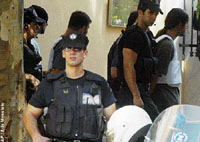 |
|||
 |
|||
|
For more news, analysis and
features from the Athens News, visit http://www.athensnews.gr

|
The End of The Beginning
These men's trial should see the first implementation of the 2001 law against organised crime. The law (No. 2928) was - and still is - highly controversial, because it allows police extensive powers of surveillance, something the 1990 terrorism law did not. Justice minister Michalis Stathopoulos attempted to sweeten the bill by emphasising the non-political nature of most organised crime rings. In so doing, he threw the punitive weight of the law on those who engage in crime for profit, pointing out that "it is reasonable that ideological criminal organisations should not be treated with the same severity as purely commercial ones" (notes to article 1). The preamble to the law even criticises the 1990 law on terrorism for "criminalising the support, abetment and concealment of terrorist organisations, creating the danger of prosecuting even the revolutionary spirit. " For Greeks, who owe their freedom to a revolution, the word 'epanastasi' is an honourable one. Yet it is this revolutionary spirit which prosecutor Ioannis Diotis must deny November 17 in court, if he hopes to strike defendants with the full force of the new law. He will likely paint the younger generation of operatives as profiteers under the fading mask of a principled revolutionary movement. At the moment no spirited prosecution seems necessary because the defendants have confessed and two of them have refused to appoint a lawyer, which suggests that they will go defiantly to life imprisonment. But the trial may be as many as 18 months in coming and their appetites could change. Other arrests are sure to follow, and future defendants may be more combative. Alexandros Yiotopoulos, a suspected leader of the group, is refusing to cooperate with police. The worst case scenario - admittedly distant - would be for defendants to succeed in characterising their actions as 'political', which must constitutionally be tried by a jury. Juries are more easily cowed by threats and swayed by romanticism than are judges, hence the 2001 law's introduction of trial by a panel of three appeals court judges. Diotis must keep the cases in this court. There is a third aspect of the investigation which helps to explain why police took so long to announce arrests. The 2001 law, being a law against organised crime, foresees harsher sentences for groups of three or more, as opposed to individuals. If police can convince the court that the Xiros brothers and Georgiadis were in conspiracy, they stiffen the punishment. If they convince the court that the men were in conspiracy for profit, they hit the legal jackpot. Just because the painting of the defendants as profiteers is a legal strategy, it does not mean that it also does not reflect the truth. The three operatives have committed a string of robberies, and may indeed have been in the game for more money than was operationally needed. They also seem to be little more than hired guns: mercenaries, not missionaries. But there is also a political reason to dampen November 17's ideological fire and instead display sodden charcoals of profitable anarchy. It is in Pasok's interest to de-politicise the issue, because there are many who consider that 27 years of inaction were due to more than indifference on Pasok's part. It may have been politically inexpedient to hunt down November 17 in the heady 1980s, a period socialist politicians called "the third round". They placed their ascendancy in the context of leftist struggles since the Civil War (1945-1949) which the communists lost. The 'second round' was George Papandreou's attempt to govern with the Centre Union party, frustrated from 1961 to 1965 by a king who refused to give him full rein as prime minister, and eventually even to recognise his popular mandate. The 1990s changed all that. The fall of communism removed the bipolar ideological background that had kept Greece in manic-depressive spasms for decades. Acco rdingly, it also undermined November 17's parochial ideological basis. The prosecutor's (and the government's) real problems will begin as the investigation winds its way up November 17's hierarchy. Public opinion may be satisfied that the group is being rendered defunct, but it will increasingly demand the arrest of the leaders. The interrogation of Yiotopoulos may lead police a step up the hierarchical ladder, but the public will be waiting to see whether there is the political courage to climb to the top of that ladder. (Posted 23 January 2003. Reproduced with permission.) |
|||||||||||||||||||||||||||||||||||||||||||||||||||||||||||||||||||||||||||||||||||||||||||||||||||||||||||||||||||||||||||||||||||||||||||||||||||||||||||||





